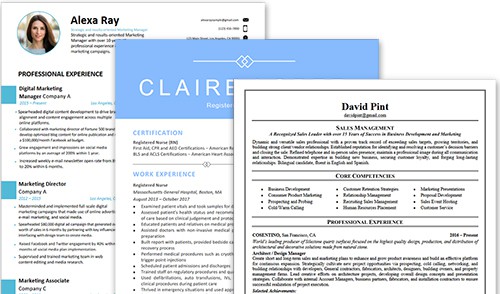Should You Put Your Address On Your Resume?
Unsure whether to include your address on your resume? We’ll go over the pros and cons of adding one and provide examples of how to do it right.

Your resume is one of the most important pieces of your job search puzzle. It provides the first impression your potential employer will have of you as an applicant and, if well done, it’s your ticket to the coveted interview!
You should consider every word carefully.
Your address is one of the first parts of your resume that your hiring manager will see. Whether you choose to include an address or not should depend on personal considerations, such as your goals, concerns and personal circumstances.
If you’re struggling to write your resume, check out our resume writing services
Should you put your resume address on your resume?
In the past, the rule was that candidates received notice that they’d been hired via telephone, and that they had been declined through the mail. But with the popularity of email, few applicants receive information through postal mail. Yet many templates still have space for a home address to be included and doing so is considered standard. It is not, however, required.
Below are some pros and cons to help you decide if including your address on your resume is the right choice for you.
How to include your address on your resume
Most candidates probably don’t give much thought to whether they should include their address on their resume and almost certainly don’t consider how it should look. That being said, there are actually several different ways you can represent your address, depending on your needs.
Below are some different ways that you can make your address work for you on a resume:
1. Using your full address
The most traditional approach to including your address on your resume is to use your full mailing address. Most resume templates will place your name and address at the top of the document, and all other information, such as skills and work history, in descending order below.
EXAMPLE:1212 Pickerington Rd., Carroll, Ohio 12345
2. No address at all
Though it is not traditional, forgoing your address in your resume is permitted – and there may be some logical reasons for doing so. However, if you make this choice, make sure you include an email address and phone number, so that a hiring manager can still reach you to coordinate an interview.
3. Listing only the city and state
This approach can be great for those who have concerns about listing their full address. You may want to give some thought to whether to include your zip code – location and distance bias can be factors with an included zip code.
However, if those are not concerns, adding a zip code may add additional legitimacy to your shortened address.
EXAMPLES:Columbus, Ohio
Columbus, Ohio 43016
4. List your region
You may wish to describe your location in terms of geographic area. This may have some benefit if your prospective employer may not have heard of your town, or if the position for which you are applying may cover a particular territory – such as a sales job.
EXAMPLES:
- Central Ohio
- Greater Columbus
- Columbus Metropolitan Area 43224
5. Listing a relocation
If you’re not currently in the hiring area specified by the job posting, but you will be relocating to that area soon, you may want to indicate that on your resume. If you wish to share your full new address, you could do so while indicating that it will be effective as of a certain date.
If you do not know your new address, or do not wish to share it, you could indicate “Relocating to City / State / Zip Code Effective Month / Year” in place of your address.
EXAMPLES:Relocating to 1276 Pleasant Rd. Columbus Ohio 12345 – Effective June 2020
or
Relocating to Columbus, Ohio 12345 – Effective June 2020
Address on resume: Pros
1. It’s expected
Though you are not required to add your address to your resume, it is traditional. Leaving it off of your resume may make the document look incomplete, or may even draw attention to the very concern you are looking to address.
For instance,when making your resume as a candidate living in temporary housing, leaving off your address entirely may lead the hiring manager to automatically draw a negative assumption about your residence.
Anything that draws the concern of your hiring manager could result in your resume being removed from the applicant pool.
2. It’s preferred by applicant tracking systems
Many companies, especially larger businesses, use applicant tracking systems, which help streamline the hiring process.
First, many of these systems require that candidates apply through an online form, which standardizes formatting. While this makes it easier for hiring managers to compare candidates on an equal playing field, it can also keep candidates from omitting information, or choosing a less common resume format.
Second, Applicant Tracking Systems scan applications for keywords and completeness of information. Therefore, even if the system allows you to leave off your resume, it may still eliminate your candidacy.
3. Location can impact job placement
You may find yourself applying to the corporate office of a company with several locations. If this is the case, the hiring manager may try to place you in a branch office close to your current location.
Failing to disclose this information may impede the hiring manager’s efforts to cross reference your address with localized needs.
4. It’s needed for your applicant file
At the time of your application, most Human Resources departments will begin a file with your personal information. Doing so will make the hiring process, or re-application process, simpler for the company and candidate down the road.
Failure to include this information may create unintended hassle, or may eliminate your resume from consideration.
5. Your employer might need it for background checks
Nearly all employers conduct background checks on their candidates. While some background checks can operate with a social security number, which you may be asked to add into an Applicant Tracking System, some background checks may still require your physical address.
Failure to include your address may be perceived as a “red flag” that you are hiding something from a potential employer.
Address on Resume: Cons
1. It feels like it’s taking up space
In all likelihood, you will receive communications regarding your candidacy via telephone or email. Some recruiters and hiring managers may even text message you. So, including a home address is a formality that, on a one to two page resume, feels like wasted space.
If you really can better utilize that space by showcasing a skill, perhaps leaving off (or shortening) your address is the best strategy.
2. Distance or commuter bias
Hiring managers may make unfair assumptions about the distance of a commute. Ultimately, whether you choose a lengthy comminute (or are required to do so for job availability), is your concern.
Your employer has the right to expect you to be punctual and to have a plan to arrive in inclement weather. How you meet those expectations, is not their business.
3. Location bias
Certain streets or zip codes may have negative connotations. And, while those neighborhoods may experience crime, or other challenges, that should not be held against an applicant.
The same discrimination may be leveraged against candidates who rent, as opposed to own, and this too may be derived from your mailing address.
4. Potential security risk
With more candidates applying for jobs they discover online, or embarking on freelancing work as a career, they may no longer be submitting their resume to a company with name recognition.
While many freelance or remote work jobs that you discover online are completely legitimate, there is always a chance that the recruiter who contacts you is “phishing” for information. Leaving off your home address may be a strategy to help protect your information from a potential identity thief.
Additionally, the Identity Theft Resource Center and the Better Business Bureau have resources to help you protect your personal information.
Lastly, when it comes to applying for a job – if it sounds too good to be true, it probably is. Trusting your instincts will help keep you from sharing your contact information and work history with someone you cannot trust.
